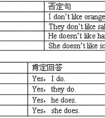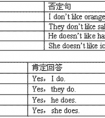句型转换,每空一词。1.The man has to see a doctor. (改为否定句)The man______ _____ to see a doctor. 2.They are staying there for three weeks.(对划线部分提问-八年级英语
empty , wrong , perfect , unique , extreme , excellent , favourite (GB)/ favorite (GA) , true , right , correct , extremely ...
形容词比较等级用法:
1.没有比较对象时,用原级。
I have a new computer.
2.两者比较,程度相同。
A+系动词+as+adj.+as+B.
Our school is as beautiful as theirs.
3.两者比较,程度不同。
A+系动词+not as+adj.+as+B.
The weather here is not as hot as that in the south.
4.A比B更…
The earth is bigger than the moon.
5.比较级前可以用much,even,still,far,a lot,a little,a bit,any等修饰。
Your room is much bigger than mine.
I’m a little shorter than her.
6.用比较级可以表示最高级含义:
John is stronger than any other boy in his class.=John is stronger than any of the other boys.
两者不属于同一范畴,不能用other.
Chongqing is bigger than any city in Sichuang.
7.“比较级+and+比较级” 表示“越来越…”
China is becoming more and more beautiful.
Days are getting longer and longer.
8.用the+比较级,the+比较级 表示”越…就越…”.
The busier he is, the happier he feels.
9. Which/Who+is+比较级 A或B?
A和B哪一个/谁更…?
Which is better,this one or that one?
最高级用法:
表示三者或三者以上的人或物的比较,一个在某方面超过其他两个或多个时,用最高级,结构是
主语+系动词+the+形容词最高级+of/in短语。
This story is the most interesting of the three.
1. one of the+形容词最高级+名词复数
它的意思是最…之一。
English is one of the most important languages in the world.
2. which/who…+is+形容词最高级
“…最...”
Which is the heaviest,the horse,the sheep or the elephant?
3.最高级前可以用序数词
The Yellow River is the second longest river in China.
|
构成 |
原级 |
比较级 |
最高级 |
|
一般加er,est |
tall |
taller |
tallest |
|
以字母e结尾只 |
large |
larger |
largest |
|
以一个辅音字母结尾的 |
red |
redder |
reddest |
|
hot |
hotter |
hottest | |
|
thin |
thinner |
thinnest | |
|
|
easy |
easier |
easiest |
|
happy |
happier |
happiest | |
|
ugly |
uglier |
ugliest | |
|
early |
earlier |
earliest | |
|
其他双音节词和多 |
interesting |
more interesting |
most interesting |
考点名称:助动词
- 助动词:
协助主要动词构成谓语动词词组的词叫助动词。
助动词是语法功能词,自身没有词义,不可单独使用,只能和别的动词一起构成谓语,表示时态、语态、语气等,或表示疑问或否定。
常用的助动词有:
be,do,does,did,have,has,shall,will,would等。 常见助动词用法:
have的用法:
have作助动词
形式:
主要变化形式:have,has,had
动名词/现在分词:having
1)have +过去分词,构成完成时态,例:
He has left for London. 他已去了伦敦。
By the end of last month, they had finished half of their work.
上月末为止,他们已经完成工作的一半。
2)have + been +现在分词,构成完成进行时(现在完成时),例:
I have been studying English for ten years.我一直在学英语,已达十年之久。
3)have+been +过去分词,构成完成时态的被动语态,例:
English has been taught in China for many years.中国教英语已经多年。
do的用法:
形式
主要变化形式:do,did,done
动名词/现在分词:doing
1) 构成一般疑问句,例如:
Do you want to pass the CET?你想通过大学英语测试吗?
Did you study German? 你们学过德语吗?
2)do + not 构成否定句,例如:
I do not want to be criticized.我不想挨批评。
He doesn't like to study.他不想学习。
In the past, many students did not know the importance of English.过去,好多学生不知道英语的重要性。
3) 构成否定祈使句,例如:
Don't go there. 不要去那里。
Don't be so absent-minded. 不要这么心不在焉。
说明: 构成否定祈使句只用do,。
4)放在动词原形前,加强该动词的语气,例如:
Do come to my birthday party please.请一定来参加我的生日宴会。
I did go there. 我确实去那儿了。
I do miss you. 我确实想你。我真想你了!
5)用于倒装句,例如:
Never did I hear of such a thing.
我从未听说过这样的事情。
Only when we begin our college life do we realize the importance of English.
只有在开始大学生活时我们才认识到英语的重要性。
说明: 引导此类倒装句的副词有never, seldom, rarely, little, only, so, well等。
6)用作代替动词,例如:
Do you like Beijing? 你喜欢北京吗?
Yes,I do.是的,喜欢。(do用作代动词,代替like Beijing.)
He knows how to drive a car, doesn't he?他知道如何开车,对吧?
may和can:
1) may用来表示许可
2)may用于所有人称的现在时及将来时句子中。
3)might用于所有人称的过去时及条件句中。
否定形式:may not/mayn't,might not/mightn't
疑问式:may I?might I?等
否定疑问式:may I not?/mayn't I?等
表示许可的may的其他形式可用allow,be allowed的相应形式代替。
4)may后面接不带to的不定式(即动词原形)。
5)can用来表示许可
6)can用于所有人称的现在时及将来时的句子中。
7)could用于所有人称的过去时及条件句中。
否定式:can not/can't,could not/could't
疑问式:can I?could I?等。
否定疑问式:can I not?/can't I?could I not?/couldn't I?等。
表示许可的can的其他形式可用于allow,be allowde的相应形式代替。
can与不带to的不定式连用。
shall和will的用法:
1)shall和will作为助动词可以与动词原形一起构成一般将来时,例如:
I shall study harder at English.我将更加努力地学习英语。
He will go to Shanghai. 他要去上海。
说明:
在过去的语法中,语法学家说shall用于第一人称,will 只用于第二、第三人称。
现在,尤其是在口语中,will常用于第一人称,但shall只用于第一人称,如用于第二、第三人称,就失去助动词的意义,已变为情态动词,试比较:
He shall come.他必须来。(shall有命令的意味。)
He will come.他要来。(will只与动词原形构成一般将来时。)
2)shall在疑问句中,用于第一,第三人称,征求对方意愿
shall I turn on the light?
要开灯吗?( 我把灯打开好吗?)
- 最新内容
- 相关内容
- 网友推荐
- 图文推荐
| [家长教育] 孩子为什么会和父母感情疏离? (2019-07-14) |
| [教师分享] 给远方姐姐的一封信 (2018-11-07) |
| [教师分享] 伸缩门 (2018-11-07) |
| [教师分享] 回家乡 (2018-11-07) |
| [教师分享] 是风味也是人间 (2018-11-07) |
| [教师分享] 一句格言的启示 (2018-11-07) |
| [教师分享] 无规矩不成方圆 (2018-11-07) |
| [教师分享] 第十届全国教育名家论坛有感(二) (2018-11-07) |
| [教师分享] 贪玩的小狗 (2018-11-07) |
| [教师分享] 未命名文章 (2018-11-07) |


![How much does it ______ to fly from Yancheng to Hainan Island?[ ]A. cost B. payC. spend D. take-七年级英语](http://www.00-edu.com/d/file/ks/4/2/shiyidongci/2020-01-05/small7dcf2f05998de63e10cc3629787031c81578210087.png)

![He always _____TV in the evening. He _____ listening to the radio. [ ]A. watch, don't like B. watches, doesn't like C. watching, don't like D. watch, do-七年级英语](http://www.00-edu.com/d/file/ks/4/2/shiyidongci/2020-01-05/small45d599b4a60b84e61cec210bfbf051f51578214524.png)
![I'd rather ___ to the Mcdonald's Restaurant because I like to listen to quiet music.[ ]A. to go B. going C. go D. went-八年级英语](http://www.00-edu.com/d/file/ks/4/2/shiyidongci/2020-01-05/small1767bba1727fef2c035c53dcbd9bc20e1578209517.png)
